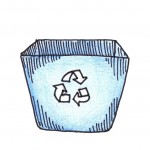Blue and gray recycling bins filled with discarded worksheets and scraps dot the campus, sitting in classrooms until a student aide sent by Biology teacher Mr. Evan Dagger comes to pick up the paper.
Six years ago, Mr. Dagger started a program to recycle paper waste, setting up recycling bins in most classrooms, the portables and the Media Center. He works with the Allan Company’s Monrovia branch, which gives the school money for recycling paper. The amount of money the school receives varies from 20 to 40 dollars per ton of paper depending on its weight and its purity.
“They’ll take paper with small paper clips or staplers in them,” Mr. Dagger said. “But if you have any piece of plastic or paper that’s been wrapped around food, like your hamburger wrapper from lunch, that’s not acceptable.”
The Environmental Club collects the money that Mr. Dagger receives, and they use it to fund club activities such as hiking and cleaning up the beaches. Mr. Dagger has hopes that the program will continue for many years.
“I think we’ve been successful so far. You just want to make sure paper waste gets recycled so we don’t have to cut down more trees,” Mr. Dagger said. “Really, it’s more of a modification than something new; there were students separating paper from the rest of the trash before. I’m just saying that now, students can help raise money by just thinking about where to put their trash.”
Black cardboard boxes dot across campus, encouraging students to recycle their water bottles and cans. It’s been six years since Ms. Mary Jane Card, a Special Education teacher, and her students began their recycling project. Originally started by a former student who brought the boxes from the state for an eagle scout project, students now take the boxes and place them around campus every morning, collecting them after 6th period and sorting through everything on Friday.
“It’s not pleasant,” Ms. Card says. “Kids put all sorts of trash, but all they are really for is bottles, cans, and glass.”
The money earned goes towards the students’ curriculum such as cooking classes and other activities. It also allows them to take fieldtrips and experience real life day to day activities, such as trips to local restaurants and shops.
“Most of them are probably never going to get normal jobs,” Ms. Cards said. “It helps my kids realize that there’s a lot of jobs that are unpleasant , but they have to be done. They’ve learned to become a lot more responsible.”


